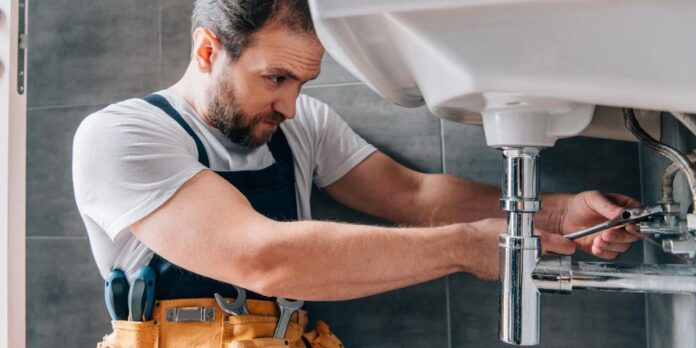Most homeowners don’t know the difference between a plumber and a plumbing contractor. After all, these two terms are used interchangeably in many online home renovation sites, thereby blurring the lines further. For common issues like a clogged sink, you contact plumbers, like Maryland underground plumbing contractors – BFMD LLC. Usually, this plumber is employed by a plumbing contractor. Plumbing contractors usually handle remodeling and tasks that involve a building’s water or septic tank system. In rare cases, the plumber is also the plumbing contractor. This is usually the case in small business enterprises.
What is a Plumber?
Imagine it’s early in the morning, and you want to take a quick shower and rush off to work. As you plan on getting into the shower, you notice an unusual sound. After a cursory look, you discover that your faucet has been dripping, resulting in water accumulation on the side of your bathtub. If you get stranded, well, in such an instance contacting professional plumbing services to come and quickly fix the problem would be the ideal move.
Plumbers are the first people you contact when you have an emergency concerning your shower drains, faucets, bathtub, hot water dispenser, and other common problems. Unclogging a toilet, for example, may seem complex to the average person, but it’s well within the skill set of a plumber. They enroll in an apprenticeship program under a plumbing service in Tulsa, OK, learning all these skills.
What is a Plumbing Contractor?
Think of a plumbing contractor as an advanced version of a regular plumber. Their tasks are usually more complicated, requiring much more apprenticeship than plumbers. For example, during the construction of a building, a plumbing contractor’s job is to ensure a building’s water and sewage system is correctly installed. Also, they install the gas connections and the water heating systems too.
The training of a plumbing contractor prepares them to handle a list of tasks like those mentioned above. For example, the backflow of water from water sources like toilets can result in contaminated water flowing in the opposite direction; This can be a health hazard. As such, most jurisdictions require buildings to have a series of preventive measures against such scenarios. For preventing backflow, buildings are required to have backflow prevention devices. Plumbing contractors have the required expertise in installing such devices.
Given the broad skills a plumbing contractor acquires through apprenticeship, it’s no surprise that their expertise is usually required during building construction planning. In this regard, their skills and knowledge are crucial in ensuring that the new building follows all local building laws. For example, they ensure that the gas valves are installed apart. Of course, their expertise is also required upon completion of the building construction. They come in to inspect and assess the plumbing work to see if any adjustments are necessary.
Requirements
Plumbers and plumbing contractors must attain licensure to practice their trade. As mentioned, the training required for becoming a plumbing contractor is much broader than for plumbers. Typically, a plumbing contractor must have additional skills and the technical expertise of handling and deal with building fixtures. These skills include customer service skills, troubleshooting capabilities, and mechanical and people skills. This is in addition to knowing the different plumbing systems and the tools needed for working on each system.
To become a plumber or plumbing contractor, you must undergo an apprenticeship then get a license.
Apprenticeship
Most plumbers and plumbing contractors go through an apprenticeship program to acquire the skills and experience needed for their trade. These apprenticeship programs are usually sponsored by employers or trade unions depending on their situation. A typical plumbing apprenticeship program can take anywhere from 3 to 5 years. Several factors can affect this timeframe. For example, it will likely take 5 years to complete if you’re doing it part-time. This usually involves classroom study hours where the apprentices learn about building codes, regulations, blueprint reading, etc. Hands-on job training is also a part of the curriculum where the skills are taught.
Licensure
After completing an apprenticeship program, a plumber can decide to go solo. This requires passing an assessment test set by the local jurisdiction while paying the necessary fees to get the license needed to practice the trade.
For plumbing contractors, you have to pass classes in business and law, in addition to the other essential requirements of licensure. This may vary from state to state.
































